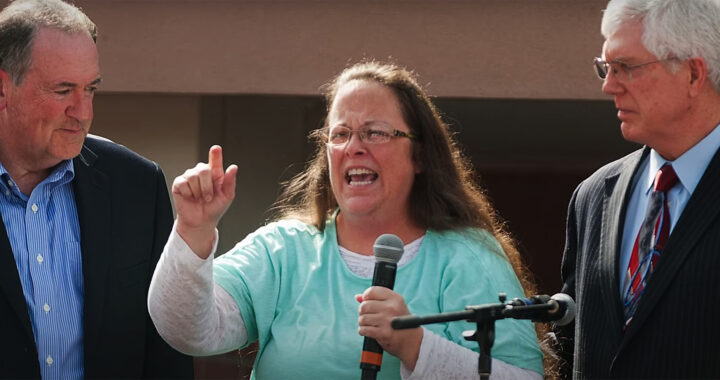Kim Davis, the Kentucky county clerk who gained notoriety in 2015 for refusing marriage licenses to same-sex couples, is back in the headlines. Now a Republican, she is petitioning the United States Supreme Court to overturn the landmark Obergefell v. Hodges decision. Her renewed fight has reignited debates over civil rights and religious freedom.
Her opposition to same-sex marriage is rooted in her Apostolic Christian faith. She earlier stated that issuing licenses to same-sex couples would make her complicit in what she views as sinful conduct. Hence, based on her beliefs, this is not simply a legal issue but a matter of eternal moral accountability and an attempt to promote her religious ideologies.
The irony in her legal and conservative crusades is difficult to ignore. She has been married four times to three different men and had divorces in 1994, 2006, and 2008. Her personal history, involving remarriage to a former husband and complex family arrangements, has drawn sharp commentary as she seeks to restrict marriage rights for others.
Davis worked for decades as the Rowan County Clerk. She became a clerk in 2015. The Supreme Court legalized same-sex marriage across the U.S. several months into her role. However, despite the landmark ruling, she defied the court by refusing to issue marriage licenses to same-sex couples. This resulted in lawsuits, contempt charges, and a five-day jail term.
Critics point to her marital history as a striking contrast to her public stance. She has 2 daughters from her first marriage and twins who were born 5 months after her divorce from her first husband. The father of these twins was her third husband, but the children were adopted by her second husband, whom she divorced and then remarried.
This intricate personal timeline, marked by multiple marriages, divorces, and remarriages, stands in contrast against her assertion that marriage must adhere strictly to a traditional definition. The contrast between her lived experiences and her restrictive stance has fueled public debate. Critics argue that her personal life undermines the moral authority she claims to have.
Supporters frame her resolve as a principled stand for religious liberty. They argue that personal failings do not negate the right to defend religious adherence and faith in public. These supporters believe that her defiance in 2015 and her current appeal to the Supreme Court represent resistance to judicial overreach and protection of conscience rights.
The U.S. Supreme Court has not yet indicated whether it will hear the petition from Davis. Legal scholars note that overturning Obergefell would be a seismic shift in American civil rights law because it could unravel nearly a decade of legal marriages. This will mark the first time that a high court reversed a landmark ruling related to civil rights protection.
